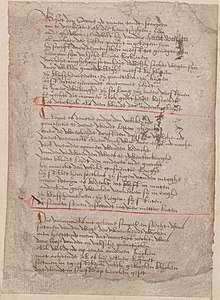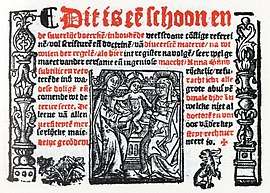Anna Bijns
Anna Bijns or Anna Byns (1493 in Antwerp – 1575 in Antwerp) was a Flemish poet who wrote in Dutch. She was also the manager of a school in Antwerp and an educator until the age of 80. Even while as a woman she was denied membership of a chamber of rhetoric, she was able to publish her works and find widespread recognition for her literary talent among her contemporaries. She is the first author in Dutch-language literature who mainly owed her success to the recently invented printing press. Her works were reprinted multiple times during her lifetime. In the religious conflicts of her time she chose the side of the Catholic church and expressed in her poems sharp criticism of the teachings of Martin Luther.[1]

Life
The elder daughter of a tailor and rederijker,[2] she opened a school in Antwerp with her brother Martin, following the death of her father and marriage of her sister. Anna Bijns was one of the rare women to be part of the brotherhood of instructors. The Franciscans encouraged her to publish her work, Chambres de Rhétoriques (French, literally chambers of rhetorics). She is subsequently recognized by the Renaissance Humanists, who consider her the best-selling Dutch author of the 16th century after Erasmus. Her work consists of religious and moralizing poems, polemic refrains against Martin Luther, whom she considered an instrument of evil, love poems and various satires. As a woman, she was unable to become a member of a chamber of rhetoric like her father, but is possibly the young maid who recited a poem at a drama festival in Brussels in 1512.[2] Her first published work was in 1528, entitled This is a pure and beautiful booklet of refrains by the honorable and ingenious maid, Anna Bijns.[2][3] It was reprinted 5 times and translated into Latin in 1529.[2] Like Erasmus, her career thanks mostly to the success of the printing press.[2] Considered the spearhead of the Counter-Reformation in the Netherlands, "she really initiated that modern speech which Filips van Marnix adopted and made classical in the next generation".[4]
Anna Bijns’ Opposition to Marriage

During the Middle Ages, women in society had the freedom to join guilds, practice professions, learn skills, etc. They were considered almost equal to men. However, things started changing around the beginning of the 14th century when women's economic and social status began to dwindle. They were not allowed to work crafts, and a woman's main occupation was reduced to maintaining the household and serving her man. Things started shifting around the beginning of the 16th century when the number of single women started increasing rapidly. Various writers started reflecting on the virtues of marriage. These writers pointed out that in order for a marriage to be happy there should be mutual affection and respect between partners. However, the fact that tradition forbade a woman from choosing her own spouse easily led to her being subordinate to him. Therefore, according to those writers, happy marriage was nothing more than a mirage.
“Cruel marriage!” is the expression Anna Bijns uses to describe the act of holy matrimony so zealously revered by others. She openly derides those naïve, in her opinion, girls who jump into marriage without putting much thought into their actions and easily calls them “sluts” and “tramps”. Back then married women were regarded as role-models by society. However, in Bijns’ views they were embodiment of frivolity and stupidity, and the author does not hide her disrespect for them. Even bigger is her detestation towards the men in society who, in her views, do nothing but drink voraciously and needlessly abuse their wives. With her poem Anna Bijns gives a very sober look on family life. She firmly opposed those moralists and religious leaders of the 15th and 16th century, who agreed that marriage was the best opportunity for both men and women to find fulfillment and happiness. Unlike them, Anna Bijns saw marriage as nothing more than constant yelling and fighting.
Anna Bijns’ poem stands out among the other texts of that time dealing with unhappy marriages, because she does not fear to attack even the most delicate matters. Bijns' work undoubtedly gave impetus to the resurrection of women’s rights and freedom.
Sources
- Dit is een schoon ende suverlick boecxken inhoudende veel scoone constige refereinen (This is a pure and beautiful booklet of refrains by the honorable and ingenious maid).(Antwerpen 1528).
- Refereinen (Refrains), three collections of poems by Anna Bijns published in 1528, 1548 and 1567.
- Refereinen (Refrains), A. Bogaers e.a. ed. (Rotterdam 1875).
- Nieuwe refereinen (New Refrains), W.J.A. Jonckbloet e.a. ed. (Gent 1886).
- Onuitgegeven gedichten (Unpublished poems), A. Soens, ed. Leuvensche Bijdragen 4 (1902) 199-368.
- Schoon ende suverlijc boecxken, L. Roose ed. 2 delen (Leuven 1987) [facsimile editie].
- ’t Is al vrouwenwerk (It is all the work of women). Refreinen, H. Pleij ed.(Amsterdam 1987).
- A few poems by Anna Bijns translated into English by Kristiaan Arcke (p 160) in Women's Writing from the Low Countries 1200-1875: A Bilingual Anthology on Google books, by Lia van Gemert, Hermina Joldersma, Olga van Marion, Dieuwke van der Poel, Riek Schenkerveld-van der Dussen, ISBN 978-90-8964-129-8
References
- Herman Pleij, Anna Bijns at Online Dictionary of Dutch Women
- Anna Bijns on inghist
- Dit is een schoon ende suverlick boecxken inhoudende veel scoone constige refereinen van de ‘eersame ende ingeniose maecht, Anna Bijns, 1528
- Ed. Dr W. L. van Helten, (1875) Chisholm, Hugh, ed. (1911). . Encyclopædia Britannica (11th ed.). Cambridge University Press.
External links

- Princesse der rederijkers. Het oeuvre van Anna Bijns: argumentatieanalyse - structuuranalyse - beeldvorming, PhD-thesis about Anna Bijns in Dutch with an English summary